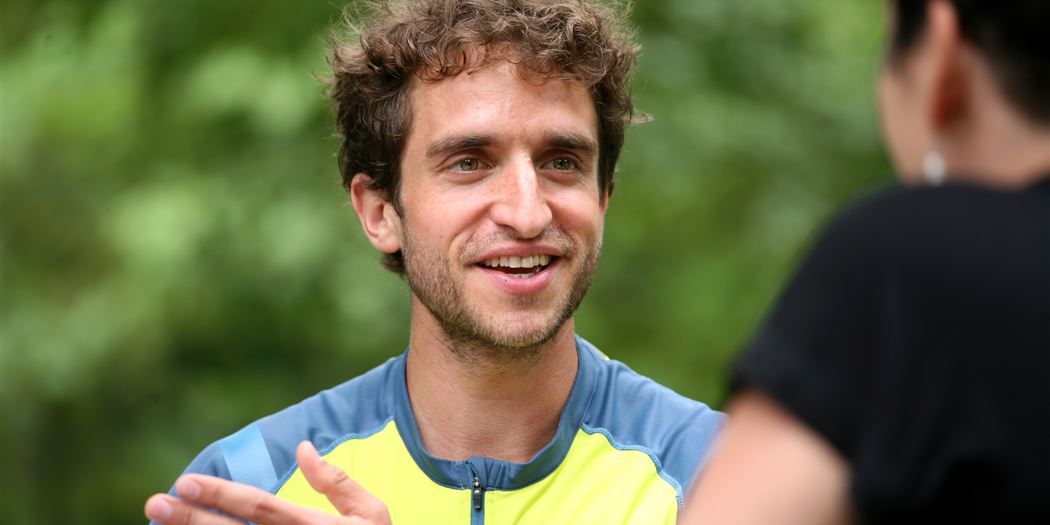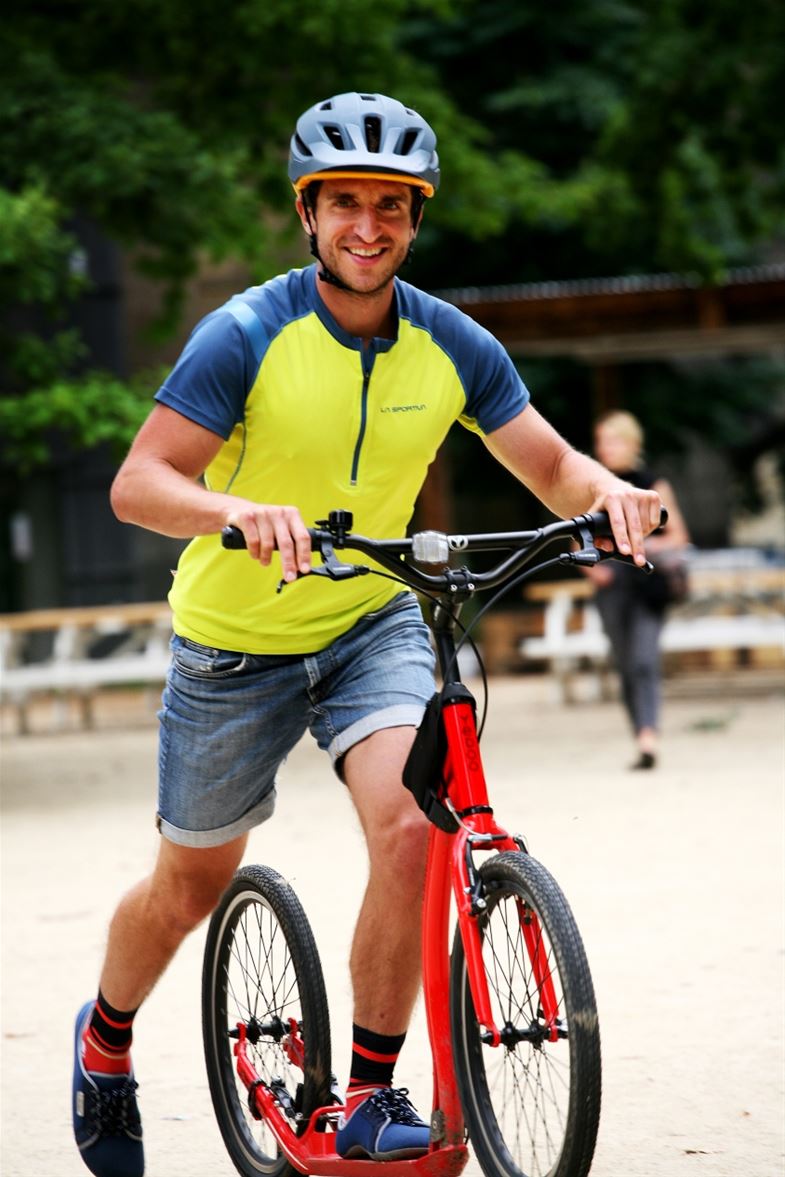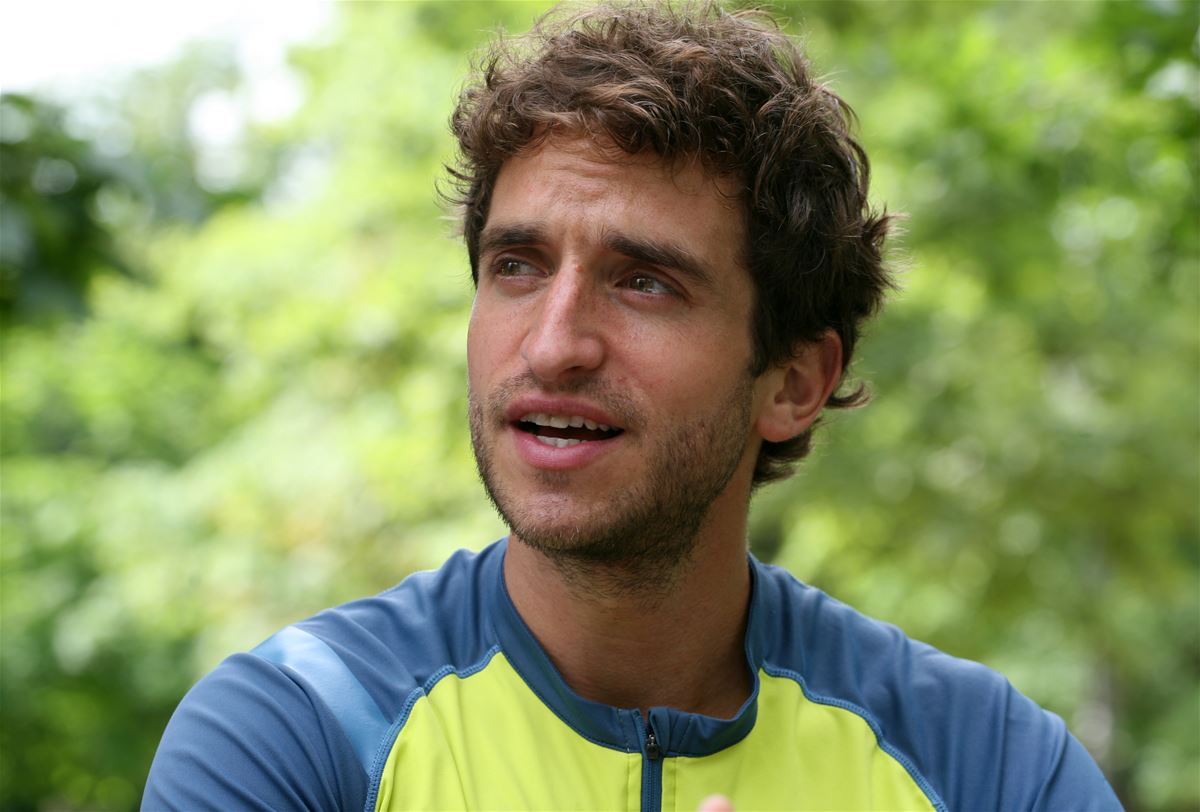Reaching happiness through movement with Ondřej Růžek
| Vendula KosíkováOndřej Růžek, a movement therapist, radiates enthusiasm and joy of life. Movement has become not only a fundamental necessity of his life and a delight, but also his dream profession.

We need physical activity
On our blog, Ondřej Růžek will explain the principles of a healthy approach to scootering to you. You can look forward to a number of practical tips, which will save you energy and will bring greater lightness and pleasure from riding.
Ondřej is one of the people, who ride to work using their own propulsion. “I switch between a bike and a scooter, depending on where I am headed on the given day. I cover more than fifty kilometres around Prague in a week. A change of activity is also the best prevention against one-sided burdening.”
“Physiologically we are set up in such a way that we need physical activity to be happy and content. Running used to help us provide subsistence – tracking, chasing down and killing prey to get tasty meat must have stirred a real tsunami of happiness hormones in us. Nowadays, we can induce this feeling by movement activity, or perhaps by “hunting” at the shopping centre. It is up to each of us, what we will choose.
“People suffer of hypokinesis – lack of movement, which comes from the preference of sedentary jobs. The fitness of the population is thereby decreasing and the incidence of excess weight increases.”
I was lucky that my father signed me up for football at the age of five already. Although I only scored some five goals, I was able to train nearly all year round and run outside in the open air. Running was actually what I enjoyed the most about football.”
Ondřej now lectures about running at the Second Faculty of Medicine of the Charles University at Motol university hospital, where he also works as a movement therapist at the Rehabilitation and Sports Medicine Clinic.
“Outdoor movement is my basic need. In Maslow’s pyramid of needs, I would place it immediately after food intake and excretion.”
He uses a wide range of techniques in his work, which respect the development principles of the human body and movement. “I mainly teach my charges to perceive movement, so they would notice the kinetic chain – how its links connect to one another. I like to speak about this procedure as a return to oneself.”

I got used to working on myself
Ondřej’s journey to his profession as a movement therapist began in primary school already. In addition to football, he also engaged in workout. “My uncle and I parked the Škoda outside the garage, brought in the weights and started a show with barbells. I am somewhat wiser now - we should have pulled ourselves up to a bar instead. But I am grateful for those times anyway, because I got used to working on myself and looking after my body.”
“Clients from the morning running lessons came to me in the afternoons to resolve their movement difficulties, and I therefore started to deal with movement more.”
When Ondřej’s classmates went to universities, he got a licence as a personal trainer and started to make a living in this way. Soon after he received an offer from Hana Dvorská, a stunt woman, to be an instructor for morning running lessons. “Mornings are fantastic for training. To this day, I enjoy movement before 7 a.m. the most.”
“I recommend to my clients to watch the incoming road instead of fixing their attention on the horizon or the destination. If I have any motto, then it is that the journey is the destination.”
His wish to find out more about the principles of movement led Ondřej to the Faculty of Physical Education and Sports at the Charles University, more specifically to the department of Sports in Nature. There, thanks to the excellent lecturer Ladislav Vomáčka, he came to understand that teaching and leading people is his fate and that it fulfils him immensely.

Practical tips
*DNS - dynamic neuromuscular stabilization works with our movement stereotypes, which arise in the course of our lives or by incorrect use of the body in daily activities or sport. DNS tries to re-program these incorrect stereotypes in our central nervous system and to optimise them using the principles of developmental kinesiology. See more about DNS.
Ondřej currently also helps people with rehabilitation and compensation of movement stereotypes at Pavel Kolář Centre of Physical Medicine. Using the globally used concept of DNS* developed by professor Pavel Kolář, he looks after the health of runners of all performance and age categories.
You can also meet him at educational seminars and courses about movement activities, which he organises with his colleagues, or by means of our blog, where he will explain the principles of a healthy approach to scootering to you. You can look forward to a number of practical tips, which will save you energy and will bring greater lightness and pleasure from riding.

